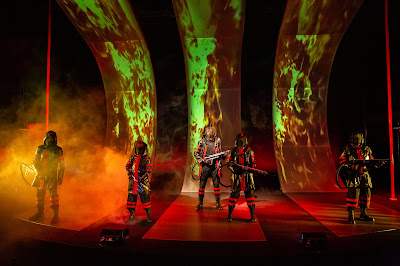Burning questions: IRT's 'Fahrenheit 451' gets to the core of cultural transmission
Current attempts in state legislatures to regulate school libraries and narrow the range of available books give Indiana Repertory Theatre an obvious pitch for its production of "Fahrenheit 451," a stage adaptation of Ray Bradbury's novella about a society where books are banned and their readers are rooted out.
 |
| The firemen maintain book-burning order in a future society. |
I'm a little cool to the genre of which Bradbury was a master. Stories predicated on a "What if...", where what fills in the space after "if" is a contrary-to-fact situation that governs the story, require a whole-hearted acceptance of the underlying condition controlling the characters.
I'm not a stickler for realism, but stories that presuppose a fundamentally different reality tend to cast people totally within its shadow. Allowing for my reluctance to readily accept "what-if" premises, a society in which book-burning is a matter of firm policy can clearly focus the attention of all literate people, as "Fahrenheit 451" has since its publication in 1953.
The bleak future the book depicts, presumably America projected from television's early heyday toward a technocratic dystopia, is elaborated in stunning detail in the production, which I saw via live-stream February 15. Bradbury is believed to have been inspired by Nazi book-burnings — communal celebrations in part, sometimes fueled by a fireman's kerosene. In 12 years, the practice consumed an estimated 100 million volumes in Germany and the European countries the regime came to occupy.
A five-person IRT team is responsible for creating a milieu in which book-burning is so embedded in the establishment that a cast of five, focusing mainly on one character apiece, is sufficient to represent what has become of human life at large. In this world, the party atmosphere of Nazi book-burnings has given way to routine authoritarianism. TV walls provide bland visual overload to maintain stability; efficient crews make house calls to quickly reverse the effects of suicidal overdoses. William Boles' scenes put nature at a distant remove. Sleek surfaces and geometric shapes rule, with the main contrast being lofty towers of flame. Fire is a tool of authority and a threat to any challengers.
The "book people," toward whom the central fireman, Guy Montag, moves as he questions his assigned role, are contrasted with the duty-bound fire crew. Izumi Inaba comes up with garb that takes off from aspects of firefighters' gear on the one hand, and, on the other, rough approximations of homeless renegades in disguise for those surreptitiously upholding the written word. Sound, lighting and projections make a seamless fit in the work of Kevin O'Donnell, Michelle Habeck, and Rasean Davonte Johnson, respectively.
Benjamin Hanna directs the show with concern for clarity and unambiguous highlighting of the central theme; Tim Decker and Amir Abdullah are mentioned below. Here I want to single out, in their clarion representation of their principal roles, Jennifer Johansen as Mildred, Montag's troubled wife; Henry Woronicz as the rebel sage Faber, and Janyce Caraballo as Clarisse, Faber's granddaughter, who spurs Montag's inclination to explore what lies outside his fire-setting duties.
Tobias Andersen's stage adaptation of the original preserves Bradbury's narrative voice, in much the same way as IRT's perennial hit version of "A Christmas Carol" folds Charles Dickens' storytelling into the dialogue and action. This procedure likewise reinforces the didactic power of both stories. In "Fahrenheit 451," passages of choral speaking in the first scene emphasize the foregrounding of lessons to be imparted.
 |
| Beatty shows Montag his collection of proscribed books. |
Beatty, the fire-station chief, has a couple of forceful monologues that are lessons in the rationale of the book-ban mandate. He lectures the wavering Montag on pre-ban society's divisiveness, which had been generated by different groups' objections to offensive reading matter.
Why encourage the erection and maintenance of intellectual silos? He would have endorsed what the Canadian media guru Marshall McLuhan once wrote (in a book!): "Electronic technology fosters and encourages unification and involvement."
It's in pursuit of collective societal rigor that book bans have often served authoritarians. Well before technology made replacement of literacy possible, newly ascendant regimes have seen destruction of books as necessary to validate them. Matthew Battles, in "Library: An Unquiet History," mentions an ancient Chinese emperor's elimination of private libraries and sometimes of their scholars, followers of the Koran in Islam's early days burning rival texts, Spanish conquistadors getting rid of Aztec books that could have helped them to administer the lands they had conquered.
Tim Decker's intense portrayal of Beatty was a well-rounded study in fanaticism desperate to enforce any unity that might be forged around the suppression and destruction of texts. "It is only in a literate culture that the past's inconsistencies have to be accounted for, a process that encourages skepticism and forces history to diverge from myth," scholars Jack Goody and Ian Watt have suggested. It's salutary to remember that insight as the best check against both excessive veneration of historical figures and the contrary urge to obliterate their statues and names on buildings. Decker's Beatty is at pains to keep post-literate controls intact, suppressing his hypocritical inclinations.
The choice of Amir Abdullah to play Montag was an inspired one. It goes far beyond the established interest that theaters have in diverse casting. For the message to get out, not just to student audiences, that book literacy is in everyone's vital interest seems to me crucial. It's not just tokenism; it's of symbolic importance that Abdullah, thoroughly fit for this role, is the central member of this cast. The world of "Fahrenheit 451" seems constrained enough as it is. Just one constant reminder that the decline of literacy is not a white problem puts immeasurable relevance into this production.
[Photos by Zach Rosing]



Comments
Post a Comment